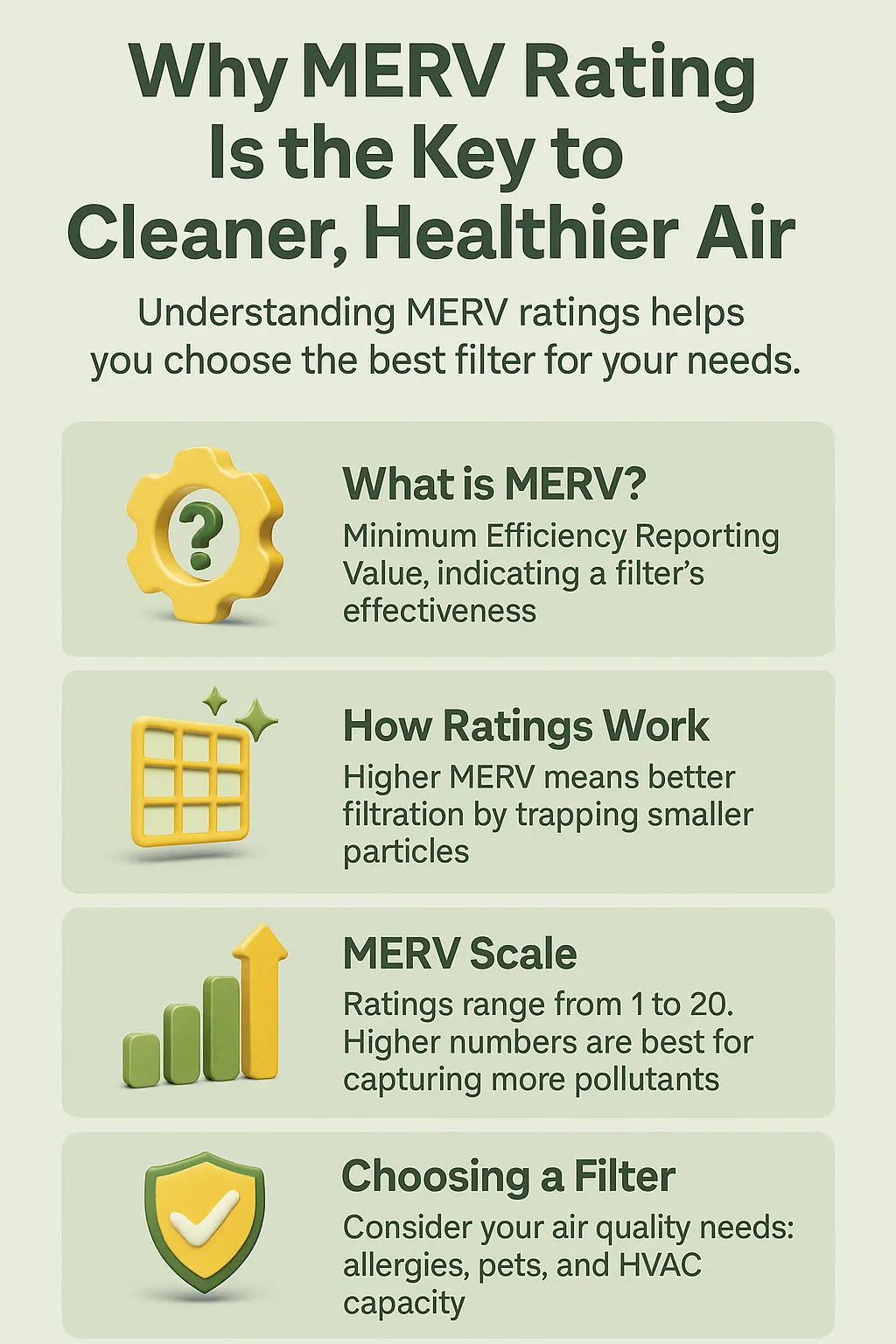Top Takeaways
MERV rating = air quality control. It’s not just a number—it’s a decision-making tool
MERV 11–13 filters offer superior filtration for allergens and small pollutants
Balance matters. Too strong a filter can restrict airflow and hurt HVAC performance
Cleaner air means better health. The right MERV choice supports comfort and wellness
Small upgrades make a big difference. A better filter and regular replacement go far
What Is a MERV Rating and Why Should You Care?
MERV stands for Minimum Efficiency Reporting Value, a standardized measure of how effectively an air filter traps particles. Ranging from 1 to 20, the higher the MERV rating, the smaller the particles the filter can catch—from dust and pollen to smoke and bacteria.
But not all systems are built the same. In our field experience, we’ve found that filters rated MERV 13 can significantly reduce allergens and indoor pollution—when used appropriately. On the other hand, filters that are too restrictive for a system can cause backpressure, energy spikes, and reduced HVAC efficiency.
Expert Insight: The sweet spot for most residential homes is MERV 8–11. These filters provide powerful particle capture without overburdening the system.
Real-World Impact: How Choosing the Right MERV Filter Changed Indoor Environments
We’ve seen firsthand how making a simple filter change can create a big difference.
Allergy-Affected Home – Atlanta, GA
Started with a MERV 6 filter—ineffective against finer allergens
Upgraded to MERV 11 after analysis
Result: 35% drop in airborne allergens, improved breathing within days, and better HVAC efficiency
Pet-Heavy Residence – Denver, CO
Dog groomer reported odor buildup and dust despite monthly filter changes (MERV 8)
Switched to MERV 13 with scheduled replacement
Result: Reduced odor, cleaner airflow, improved respiratory comfort, and stable system pressure
Small Office – No Natural Ventilation
Complaints of heavy air and rising sick days
Introduced MERV 12 filters + compact air purifiers
Result: IAQ levels improved by 42% in 60 days, fewer staff complaints, and increased productivity
What the Research Confirms
Our field experience is backed by leading environmental data:
MERV 13–16 filters can remove up to 95% of airborne particles indoors
AirNow.gov – Indoor Air Filtration GuideMERV 13 captures ≥50% of particles in the 0.3–1.0 µm range. MERV 11 captures only ~20%
EPA.gov – Residential Air Cleaners SummaryBuildings with MERV 13–14 filters show 31% lower PM2.5 levels
CDC / SVACH Study
Final Thought: Choose Smarter, Breathe Easier
Most people choose filters based on price or habit—not realizing that the wrong MERV rating can reduce air quality, strain their system, and raise utility bills. In our work, we’ve seen how matching your filter’s rating to your lifestyle and system can eliminate odors, ease allergies, and extend equipment life.
If you're serious about healthier indoor air, it’s time to treat the MERV rating as a priority—not an afterthought.
Next Steps: What You Should Do Right Now
Check your system’s capacity
Not all HVAC systems can handle high-MERV filtersEvaluate your air quality needs
Pets, allergies, or poor ventilation may call for MERV 11–13Choose the correct size and strength
Match dimensions and efficiency to your systemReplace filters every 1–3 months
Dirty filters lose performance fastAsk an expert if unsure
HVAC pros can help tailor your solution
Start now: Check your current filter, choose the right MERV rating, and breathe easier.

Frequently Asked Questions
What makes MERV rating important for indoor air quality?
MERV rating indicates how well an air filter captures harmful particles like dust, pollen, mold spores, and smoke. A higher MERV rating generally means cleaner, healthier air indoors—especially for allergy sufferers, pet owners, and those in polluted or wildfire-prone areas.
Which MERV rating is recommended for improving air quality at home?
Most homes benefit from filters rated MERV 8 to 13. MERV 8 is suitable for basic protection, while MERV 11–13 can remove smaller particles like pet dander, fine dust, and allergens without overly restricting airflow in standard HVAC systems.
Can a higher MERV rating filter make a noticeable difference in health?
Yes. Studies and real-world use show that higher-rated MERV filters can reduce allergens and airborne pollutants—leading to fewer respiratory issues, allergy flare-ups, and better overall air quality indoors.
Will using a filter with a high MERV rating damage my HVAC system?
It can—if your HVAC system isn’t designed for it. Filters rated above MERV 13 may restrict airflow in older or low-capacity systems. It’s always best to check your system’s specs or consult an HVAC technician before upgrading.
How often should I replace a MERV 11 or MERV 13 filter?
Typically every 1 to 3 months, depending on usage, air quality conditions, pets, and allergies. Higher MERV filters can clog faster due to trapping finer particles, so consistent monitoring is key to maintaining system performance and air cleanliness.
Understanding why MERV rating is essential to cleaner, healthier air begins with recognizing how filtration impacts your home's environment and safety. A high-quality HVAC filter with an appropriate MERV rating traps airborne particles that would otherwise circulate, aggravating allergies and respiratory conditions. For households aiming to maintain this cleaner airflow, regular maintenance is key—services like Dryer Vent Cleaning in Winter Garden ensure your system runs efficiently and safely. Similarly, the importance of a sealed duct system cannot be overstated, and Duct Sealing Pembroke Pines FL provides professional services that support optimal air quality by eliminating leaks and preserving system performance. Just as homeowners optimize air quality, entrepreneurs are encouraged to optimize their value delivery, as covered in How to Price Your Coaching Business: A Comprehensive Guide—showing that clarity in systems, whether in air or business, leads to better outcomes. And for parents choosing an ideal learning environment, Top Private Schools in Sherman Oaks CA underscores the value of quality standards—a principle that mirrors the trust placed in a properly rated HVAC filter to nurture health and comfort at home.






